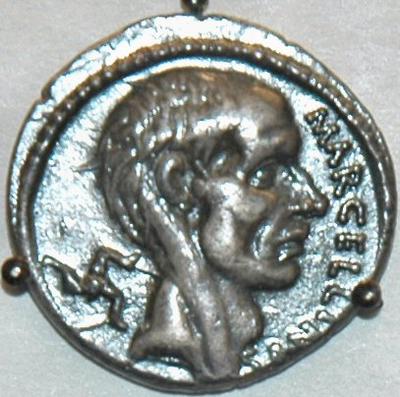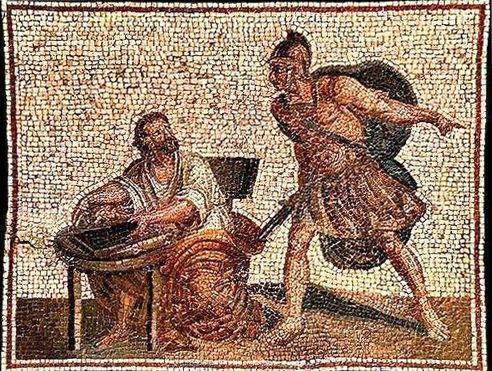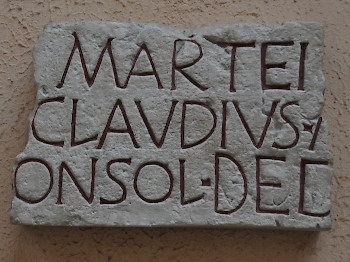Marcus Claudius Marcellus
Marcus Claudius Marcellus (†208 BCE): Roman commander, well-known for the capture of Syracuse.

The career of Marcus Claudius Marcellus, the son of Marcus, was dominated by one conflict: that between his own country, the Roman republic, and the republic of Carthage. The two nations had been on friendly terms for much of the fourth and the early third century, and had fought against the Epirote king Pyrrhus together, but in 264 BCE they had started a war, which had to settle the question who was to own Sicily. We know that as a young man, Marcellus was involved in this First Punic War, and saved the life of his brother. The Greek author Plutarch of Chaeronea, who wrote a Life of Marcellus, states that because of his heroic behavior during this war, the Romans made Marcellus aedile.
He must have proceeded to the praetorship, which he occupied at an unknown date, and was consul in 222, together with Gnaeus Cornelius Scipio. It was to be the first of five consulates, a rare distinction.
As consul, Marcellus had to wage war on the northwestern plains of the Po, where the Celtic Insubrians lived. In the preceding year, Gaius Flaminius had defeated them and had celebrated a triumph. After this, he laid down his office, so that the next pair of consuls of could enter its duties on 15 March, earlier than usual. (The first of January became the beginning of the consular year in 153.)
Marcellus continued the war, although the Insubrians had already announced their surrender. But Marcellus and Scipio refused their conditions and the Insubrians attacked a Roman stronghold at Clastidium. Scipio, following the original Roman battle plan, proceeded the heartland of the Insubrians, and Marcellus tried to relieve Clastidium. Here, he fought a duel with the Insubrian leader Viridomarus, whom he killed. He was to return to Rome with spolia opimia, "supreme spoils", i.e., when a Roman supreme magistrate killed a king in battle. The Roman poet Naevius wrote a play about this incident.
After this success, Marcellus learned that his colleague encountered troubles near Mediolanum (Milan), and Marcellus set out to help him. After his appearance, the Insubrians surrendered unconditionally, and the Romans founded a new colonia, Cremona, which guarded a passage of the Po. Marcellus celebrated his first triumph.
We don't know anything about Marcellus' career after his triumph over the Insubrians, but he was certainly respected as one of Rome's foremost generals, because he was appointed as admiral in 218, when the Second Punic War broke out, and the Romans expected naval warfare near Sicily. This was an error: the Carthaginian general Hannibal Barca, once the governor of Carthage's Spanish possessions, crossed the Alps and the war was mainly fought on Italian soil.
In 216, after terrible Roman defeats at the Trasimene lake (where the above mentioned Flaminius was killed in action) and Cannae (one of the greatest disasters in Roman history), Marcellus showed his value again. As praetor (for the second time), he sent a part of the soldiers of his fleet to protect Rome against Hannibal, gathered the remains of the army of Cannae, and reinforced Naples and Nola.
Next year, he was briefly consul. If we are to believe Posidonius of Apamea, the Romans believed that whereas his colleague, their former dictator Quintus Fabius Maximus Cunctator, was their shield, Marcellus was their sword. Unfortunately, religious scruples prevented Marcellus from performing his task. As proconsul, however, he returned to Nola, and defeated Hannibal's rear guard.
In 214, he occupied the consulship for the third time. By now, the war against Hannibal had changed. The Romans evaded direct engagements and two experienced generals, Publius and Gnaeus Cornelius Scipio, tried to cut off Hannibal's supply base in Hispania. Now, Marcellus captured Casilinum and started to force the Carthaginians to the south. He celebrated a second triumph.
Next year, he crossed to Sicily, where he did his best to prevent a Carthaginian take-over. This was successful, and Marcellus started the blockade of Syracuse, which was believed to be impossible to capture; not even the Athenians had been able to take it during the Peloponnesian War (more...).

At the same time, the Romans started to besiege the former Roman ally Capua, which had sided with Hannibal. Slowly, Rome was regaining its strength. In 212, Marcellus took Syracuse, an event that was to be remembered for several reasons: in the first place, because it was an important victory; in the second place, because the great scientist Archimedes of Syracuse died during the sack of the city; and in the third place, because Marcellus took away many works of art from Syracuse, which were to adorn Rome. From now on, Rome knew something about Greek art. The story is told by Plutarch:
When Marcellus was recalled by the Romans to the war in their home territories, he carried back with him the greater part and the most beautiful of the dedicatory offerings in Syracuse, that they might grace his triumph and adorn his city. For before this time Rome neither had nor knew about such elegant and exquisite productions, nor was there any love there for such graceful and subtle art; but filled full of barbaric arms and bloody spoils, and crowned round about with memorials and trophies of triumphs, she was not a gladdening or a reassuring sight, nor one for unwarlike and luxurious spectators. [...] Therefore with the common people Marcellus won more favor because he adorned the city with objects that had Greek grace and charm and fidelity; but the elder citizens [...] blamed Marcellus, first, because he made the city odious, in that not only men, but even gods were led about in her triumphal processions like captives; and again, because, when the people was accustomed only to war or agriculture, and was inexperienced in luxury and ease, but, like the Heracles of Euripides, was "Plain, unadorned, in a great crisis brave and true," he made them idle and full of glib talk about art and artists, so that they spent a great part of the day in such clever disputation.note
After this success, Marcellus could have celebrated a third triumph, but he declined because "something still remained to be done in Sicily and a third triumph would awaken jealousy", as Plutarch says. Marcellus was happy to promise a temple to Honor and Virtue. Yet, the capture of Syracuse had been an important victory.

Marcellus was elected consul for the fourth time, in 210, and fought in Samnium. After a Roman defeat in Apulia, he invaded this part of Italy, and fought against Hannibal at Numistro. After a long fight, both armies went back to their camp; the next day, Marcellus offered battle again, but Hannibal declined. It was celebrated as a Roman victory, and Marcellus' command was prolonged. Serving as proconsul in 209, he continued to pursue Hannibal through southern Italy, but the Carthaginian general often shifted his camp and declined battle.
Marcellus was consul for the fifth time in 208. He suppressed a revolt in Etruria, and wanted to dedicate the temple of Honor and Virtue, but the priests thought that two gods could not share one sanctuary and prevented the dedication. Therefore, Marcellus promised to build a second shrine.
Marcellus died in an ambush. While inspecting the country where Hannibal supposed to be, his enemies unexpectedly arrived and killed one of Rome's greatest leaders.